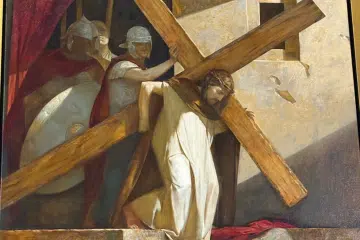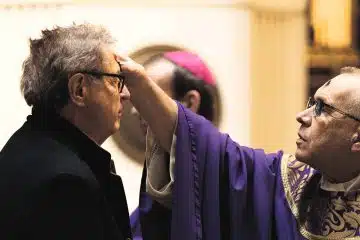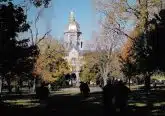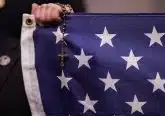USCCB 2020 fall meeting: Day 1 recap
CNA Staff, Nov 16, 2020 / 06:38 pm MT (CNA).- An emphasis on the need for healing, in both the Church and broader society, was prominent throughout the first day of the fall general assembly for the U.S. Conference of Catholic Bishops (USCCB).
In his address Monday, Archbishop Jose Gomez of Los Angeles, president of the conference, called for a “heroic Christianity” that forms missionary disciples.
The COVID-19 pandemic has shaken people’s faith in God, Gomez said. More than just a public health emergency, the pandemic has raised “fundamental questions about divine Providence and the goodness of God,” and it is the Church’s duty to share the Gospel message as a response to the fear and uncertainty that are pervasive in society.
“This is our mission in this moment,” he said. “To continue to bring healing and hope to the people of our time.”
Archbishop Christophe Pierre, Apostolic Nuncio to the United States, called on Catholics to be Good Samaritans in order to bring healing to a deeply fractured and increasingly secular world.
The U.S. bishops’ annual Fall General Assembly is being held Monday and Tuesday this week. The assembly is being held virtually this year because of the ongoing pandemic.
Most of the presentations were pre-recorded and thus did not discuss the findings of the McCarrick Report last week by the Vatican. The highly-anticipated 460-page report covered the Church’s institutional knowledge and decision-making regarding Theodore McCarrick, the former American cardinal who was laicized in 2019.
However, the report still played a prominent role in the discussions on the first day of the assembly. The bishops voiced their sorrow at the findings of the report. They expressed thanks to the pope for releasing the report and for the steps taken since 2018 to improve accountability. They called for transparency and reform.
They also called for prayer and penance, with Archbishop William Lori of Baltimore encouraging the bishops to fast weekly and spend an hour a day in Eucharistic adoration in reparation.
“I say this because it is in those moments of prayer that the problems described in the McCarrick Report cease to be merely structural problems, cease to be a kind of a problem that is ‘out there’ to be solved by other people, but rather it is where we begin to take some personal responsibility for what has happened in the life of the Church,” Lori said.
Bishop Michael Olson of Fort Worth called for financial transparency, noting that McCarrick’s financial misconduct had not yet been fully accounted for.
The bishop said that McCarrick “gave money to clerics and organizations that were not named in the report.”
“For us to offer warrant of our commitment to conversion, that is called for by this report, by the faithful, that the system won’t permit this to happen again, and those of us operating within the system, those organizations and clerics should be named,” he said.
Also during the first day of the meeting, the National Advisory Council – a group of lay and religious advisors from a variety of ethnicities, ages and backgrounds – encouraged the bishops to make the Ad Hoc Committee Against Racism a permanent committee and to engage in listening on the subject of racism before trying to respond.
The council encouraged the bishops to clarify the difference between efforts to fight racism and support for the organization Black Lives Matter. It asked that the bishops help the Church play an “active role in domestic abuse recognition, intervention, recovery and healing,” particularly during the COVID-19 pandemic.
The National Review Board, a group that collaborates with the U.S. bishops on the prevention of sexual abuse of minors, called for efforts to evaluate the effectiveness of abuse prevention training programs for adults and children.
The bishops voted Monday on several conference positions.
Monsignor Jeffrey Burrill, STL, who had served as Associate General Secretary for the USCCB since 2016, was selected for a five-year term as the conference’s General Secretary.
Cardinal Timothy Dolan of New York was selected as chairman of the Committee for Religious Liberty, while Archbishop William Lori of Baltimore was voted head of the Committee on Pro-Life Activities.
Bishop Thomas Daly of Spokane was chosen as chairman of the Committee on Catholic Education, and Bishop James Wall of Gallup was elected to chair the National Collections Committee.
Auxiliary Bishop Robert Reed of Boston was elected to head the Committee for Communications, and Auxiliary Bishop Arturo Cepeda Escobedo of Detroit was chosen as chairman of the Committee on Cultural Diversity in the Church.
Archbishop Timothy Broglio of the Archdiocese for the Military Services was re-elected for a second three-year term as Secretary of the USCCB.
The bishops also voted on several action items, the results of which will be announced on Tuesday.
They voted on whether to reauthorize the Ad Hoc Committee Against Racism for three years.
The ad hoc committee was established in August 2017 in the wake of increasing racial tensions and white nationalist activism. Its work has included a press conference at the Martin Luther King Jr. Memorial in Washington, D.C., an award-winning children’s book on healing and reconciliation, and the creation of resources for the Sept. 9 Feast Day of St. Peter Claver as an annual day of prayer for peace within communities.
The committee also promotes education, resources, communications strategies, and care for victims of racism. It is funded by the Knights of Columbus, Catholic Campaign for Human Development, and the Black and Indian Missions Office.
The bishops’ conference released a pastoral letter dedicated to fighting racism in 2018, entitled, “Open wide our hearts: the enduring call to love.”
The committee has been led since May 2018 by Bishop Shelton Fabre of Houma-Thibodaux, La. It was previously led by Bishop George Murry, S.J. of Youngstown, Ohio, who resigned in 2018 due a recurrence of leukemia.
The U.S. bishops also voted Monday on the 2021-2024 USCCB Strategic Plan, which guides the allocation of resources and personnel at the conference.
The strategic plan was developed over two years with regional input on priorities, explained Archbishop Timothy Broglio, the conference secretary.
The theme for the strategic plan is “Created Anew by the Body and Blood of Christ, Source of Our Healing and Hope.”
Broglio called it an “inspirational theme which will elevate the faithful by reminding them of the power of the very source and summit of our faith, the body and blood of Christ,” while acknowledging the challenges facing the Church, including the coronavirus pandemic and the abuse crisis.
In addition, the bishops voted on the 2021 proposed budget.
Bishop Gregory Parkes of St. Petersburg, treasurer of the conference, explained that the coronavirus pandemic created volatility in the market, but there has been significant recovery since the early days of the pandemic.
Still, he said, with many parishes closed, people out of work, and dioceses in bankruptcy, there is no proposed increase in the diocesan assessment. Instead, the conference has been working to reduce spending in 2020 and curtail expenses in the 2021 proposed budget.













